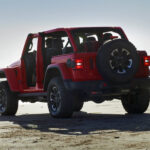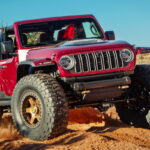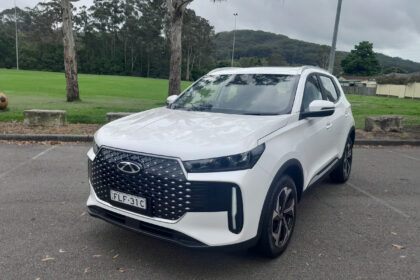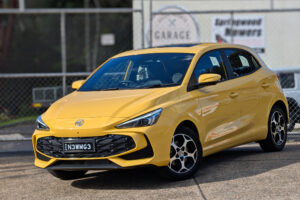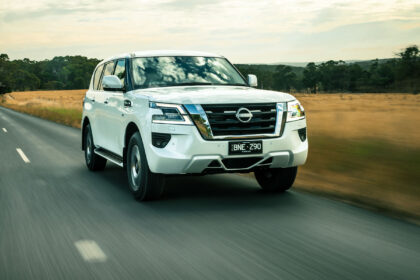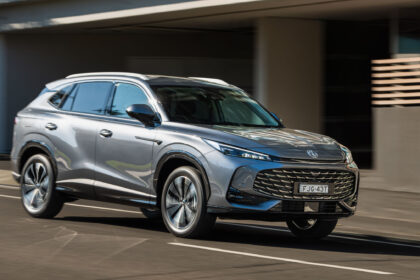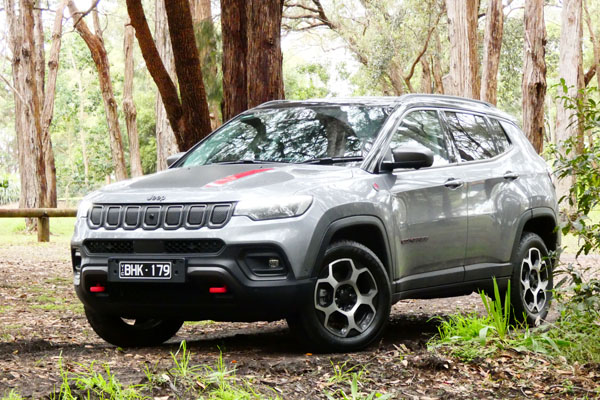
Compass is the baby of the Jeep family and looks like a downsized-version of Grand
Cherokee.
Introduced in 2007, Compass and sibling the Patriot, a reskinned, rebadged version of the
car, were the first of Jeep’s softer crossover offerings.
Compass was rounder, cuddlier and generally more citified twin, while the Patriot which
was dropped in 2016 was a bit squarer and more macho.
Survivor Compass continues to fly the flag for the iconic American brand, targeted at first
time buyers and those whose driving is confined mainly to paved roads.
For the first four years the Compass range didn’t include a Trail-Rated version, which in
Jeep speak is a guarantee of off-road prowess.
STYLING
The latest Compass is a modern beast, with enhanced tech, redesigned dashboard, a
refined cabin and impressive list of driver assistance systems.
Trailhawk is distinguished by a unique radiator grille, body-coloured foglight surrounds, a
prominent bash plate and 17-inch alloy wheels.
The horizontal lines of the front are repeated at the rear, with tail lights that provide a more
modern and commanding look.
Bumpers, foglights and camera radar have been relocated higher and out of the way to
avoid damage off road.
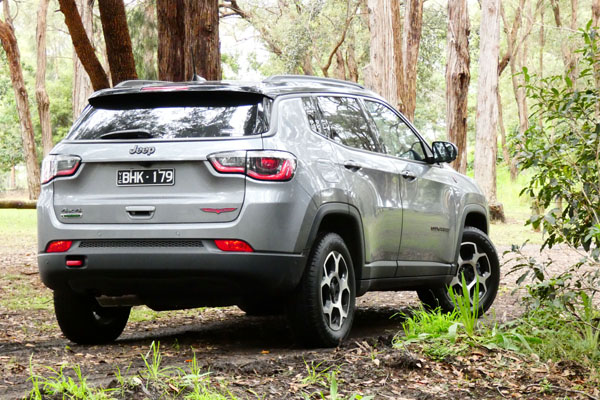
LED daytime, high beam, low beam and fog lights boost brightness by 100 per cent.
Prices start from $39,950 for Night Eagle (love that name), followed by Limited at $45,350,
S-Limited at $48,350 and finally Trailhawk at $52,650 — with Premium paint another $645.
A Premium Package adds a twin-pane sunroof, heated and cooled front seats, heated
steering wheel and premium Alpine nine-speaker audio — all for $3950.
The interior has been redesigned with functionality and better use of space in mind
Standard kit includes leather with red stitching, two-zone climate air, push-button start,
power adjust heated and cooled front seats, a heated steering wheel, rubber mats and
reversible cargo area liner.
It has LED head and tail lights, automatic low/high beam, parallel and perpendicular park
assist, front and rear parking sensors, auto lights and wipers, auto dimming rear-view
mirror and an electric parking brake.
Compass comes with a 5-year/100,000km warranty and lifetime roadside assistance for
vehicles serviced by Jeep.
Capped-price servicing for Trailhawk means you’ll pay $399 per visit for the first five
services, with intervals set at 12 months or 20,000km — whichever comes first.
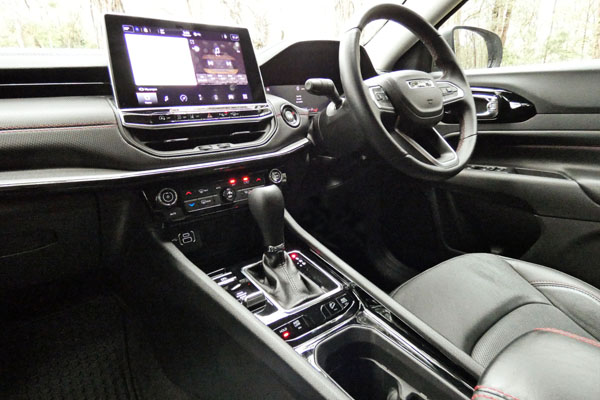
INFOTAINMENT
It has the latest Uconnect 5 system, with a 10.1-inch touchscreen and six-speaker audio
as standard, featuring voice control, Bluetooth, TomTom navigation, DAB+ digital radio,
fully customisable homepage and new ‘touch and swipe’ mode with the option to create
widgets.
You can create multiple user profiles that store customised music preferences, apps, seat
position, mirror angles and aircon levels, plus frequent destinations and ‘Valet’ mode.
There’s also wireless charging and wireless integration via Apple CarPlay and Android
Auto, with first row USB Type A/C and second row USB Type A/C, 230V and 12V outlets.
The optional Alpine system boasts a 12-channel, 506-watt amplifier, with nine strategically
placed speakers including a dual voice coil and 20cm subwoofer.
ENGINES / TRANSMISSIONS
Trailhawk is powered by a 2.0-litre turbo-diesel that delivers 125kW of power and 350Nm
of torque, the latter from 1750 revs. It is paired with a nine-speed sequential auto. You can
change manually with the transmission shift.
SAFETY
Safety includes, front, side and curtain airbags, forward collision warning, electronic
stability control with electronic roll mitigation, blind spot monitoring, rear cross path
detection, lane departure warning plus and rear back-up camera.
Added to these are traffic sign recognition, intelligent speed assist, drowsy driver alert and
automatic emergency braking with pedestrian and cyclist recognition.
A new 360-degree camera is standard in Jeep Trailhawk.
DRIVING
The 4×4 system is the same ‘Jeep Active Drive Low’ system that can be found in Limited
and S-Limited models and is a part-time system that sends torque to the rear wheels as
required.
What this means is that most of the time it operates in front-wheel drive.
The dash from zero to 100km/h takes 9.7 seconds and fuel consumption is a claimed
6.9L/100km.
To put this in perspective, diesels are fast approaching their use by date, especially in the
context of smaller SUVs, which makes this one a bit desirable.
Not only do diesels offer superior fuel economy, the lazy, low-revving engines are better
suited to the demands of off-road driving.
They are not prone to water problems and are able to operate just above stall speed which
allows drivers to pick their way through tricky terrain.
First up Trailhawk’s on-road performance where it will spend most of its time.
It’s generally slow to respond to the throttle, with two seconds of turbo lag and feels like
you’re driving with the handbrake on most of the time.
The steering is heavy at low speeds but becomes lighter the faster you go – ideally it
should be the other way around.
Driving, it feels like you’re fighting against the lane keeping assistance the whole of the
time. We deactivated this feature and it transformed the way the car drives. The steering
immediately became lighter and more manageable around town, but the prospect of
having to switch it off each time is unappealing.
Inside Trailhawk is well kitted out, a snug but comfy fit, with limited rear legroom and a
smallish boot.
The driver faces a new, ultra-high definition, 10.25-inch digital instrument cluster which can
be configured differently with the push of a button.
Other minor annoyances include the handbrake which does not engage automatically
when you put the transmission in park and the surround/rear view camera which just isn’t
that good.
But the doozy is the cruise control button.
The big cruise control button on the right of the steering wheel does not activate adaptive
cruise, just the garden variety that doesn’t do the braking for you. We discovered this when
we almost ran up the bum of a car in front.
To activate adaptive cruise, you need to use the button to the left of the big one.
It’s a trap waiting to catch the unwary and wonder how this one got through to the keeper.
A lot of reviewers of Trailhawk bang on about how this is the only compact SUV you can
get with real off-road ability.
After all, it’s got low-range, 225mm of ground clearance and wading depth of 480mm, with
approach and departure angles of 30.3 and 33.6 degrees.
It also has a 180A alternator, 4.334 rear axle ratio, four underbody bash plates and two
recovery hooks.
And, it rides on smaller, more practical 17-inch alloys with chunkier 225/60 series Falken
All-Season rubber plus a full-size steel spare.
The big drawcard, however, is that Trailhawk is ‘Trail-Rated’ which once upon a time
meant that it had been tested on the famed Rubicon Trail, west of Lake Tahoe in
California.
But, digging a little deeper, it turns out that Trailhawk doesn’t in fact have low range.
Although it has a button called 4WD LOW, it does not have a two-speed transfer case and
therefore couldn’t possibly have a low range gear set.
All this button does is keep the transmission in first gear, which is possible with most
automatics.
Another button promises 4WD LOCK. What this does is transmit torque equally to both the
front and rear wheels.
In most SUVs, the front wheels do all the work and torque is only diverted to the rear if
there is a loss of traction.
Most SUVs come with this feature too.
There are other buttons for Rock, Sand-Mud, Snow and Auto modes.
Preparing to do battle, we sat facing a boggy waterhole on our favourite section of fire trail.
It was the wettest we’d ever seen it and we were not confident of the Trailhawk’s ability to
get through.
That about sums up the situation and it begs the question: what does ‘Trail-Rated’ actually
mean?
According to Jeep: “It’s earned. Every Trail Rated 4×4 Jeep Brand vehicle has succeeded
against a series of gruelling tests in five categories: Traction, Water Fording,
Manoeuvrability, Articulation and Ground Clearance”
Short answer. A Jeep doesn’t have to go anywhere near the Rubicon to be certified Trail-
Rated.
The rating is actually part of an ‘independent’ certification process, conducted by the
Nevada Automotive Test Centre (NATC), which does not reveal scores.
SUMMING UP
Trailhawk is expensive for a small SUV. Like most Jeeps, it looks pretty good, is well
equipped and there’s that promise of adventure.
But if you’re looking for a serious off-roader, then we’d suggest taking a closer look at the
fine print and reading all the footnotes — basically it’s too much money for something that’s
not going to do the job.
RATINGS:
Looks: 7.5/10
Performance: 6/10
Safety: 8/10
Thirst: 8/10
Practicality: 7/10
Comfort: 7/10
Tech: 8/10
Value: 7/10
Overall: 7.3/10
AT A GLANCE
MODEL RANGE:
2.4 Night Eagle petrol: $39,950
2.4 Limited petrol: $45,350
2.4 S-Limited petrol: $48,350
2.0 Trailhawk diesel: $52,650
Note: These prices do not include government or dealer delivery charges. Contact your
local Jeep dealer for drive-away prices.
SPECIFICATIONS (Jeep Compass Trailhawk 2.0L Turbo-diesel 4-cylinder, 9sp automatic,
AWD)
ENGINE:
Capacity: 2.0 litres
Configuration: Four cylinders in line
Maximum Power: 125 kW @ 3750 rpm
Maximum Torque: 350 Nm @ 1750 rpm
Fuel Type: Diesel
Combined Fuel Cycle (ADR 81/02): 6.9 L/100km
CO2 emissions: 181 g/km
DRIVELINE:
Nine-speed automatic, all-wheel drive
DIMENSIONS, WEIGHT AND CAPACITIES:
Length: 4398 mm
Wheelbase: 2636 mm
Width: 1819 mm
Height: 1657 mm
Turning Circle: 10.76 metres
Kerb Mass: 1621 kg
Fuel Tank Capacity: 60 litres
BRAKES:
Front: Ventilated disc 305 x28 mm
Rear: Solid disc 278 x 12 mm
STANDARD WARRANTY:
Five years/unlimited kilometres




